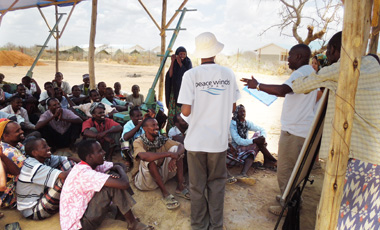COVID-19: A Growing Crisis for Displaced Communities

There are growing fears of the substantial human impact with the arrival of COVID-19 within particularly vulnerable populations across Africa and Asia. While the numbers of confirmed cases has not reached the scale of those experienced in China, Italy and US, the numbers are beginning to rise in countries such as Bangladesh and Iraq and are also increasing across Africa.
“Our teams are on high alert and are responding to the growing threat of COVID-19”, said Peace Winds America Chief Executive Wayne Nissly. “What we are finding is that many mitigation strategies that work in developed countries simply do not work in displaced communities.”
Lockdowns and shelter-in-place orders that seem to flatten the curve in other parts of the world, unfortunately, within refugee camps only serve to further restrict access and flow of goods for those in need of assistance and exacerbate many existing vulnerabilities. For Syrian refugees in Northern Iraq, extended curfews and restricted access to camps are delaying life-saving aid, and posing significant strain on the most vulnerable!
Social distancing is simply unrealistic for refugee families living side by side in overcrowded tents in densely populated refugee settlements. There is not much room to socially distance, as everyone stands in line for hours to get food rations, water, and essential services. This is especially true for Rohingya refugees in Cox Bazar, Bangladesh, where camps are among the most crowded in the world.
In many settings, water is simply too scarce to allow frequent hand-washing. This is true for Somalis in Dadaab, a barren refugee camp in Kenya, home to over 200,000 displaced people. Water is insufficient for frequent showers, much less vigilant hand washing.
Peace Winds staff support millions of people across the globe who do not have the luxury of safe space, clean water, soap, or medical care should they become sick. This is where Peace Winds is uniquely positioned to assist communities in some of the world’s poorest countries, utilizing our expertise in sanitation and hygiene promotion, community education, and healthcare worker training. With the commitment of our donors and supporters, Peace Winds is actively pursuing the following activities:
Water, Sanitation and Hygiene
- Getting clean water and soap to refugee communities as quickly as possible.
- Partnering with United Nations High Commissioner for Refugees (UNHCR) to get basic hygiene kits to refugee communities, which include soap, face masks, and other items.
- Installing hand-washing stations in refugee camps. Where some already exist, we are widely scaling these as quickly as possible.
- In settings where water is scarce, working to form refugee working groups to produce effective hand sanitizer, providing simple ingredients (aloe and alcohol >60%) along with containers for their distribution.
Community Education — Behavior Change Strategies
- Touching the face is a key mechanism in the transmission of the virus, far more common than airborne transmission –Hygiene promotion through constant messaging to refugee communities emphasizing the critical role of reducing how often we touch our faces.
- Messaging, via WhatsApp, facebook, or other media can emphasize what people can do to stay safe, and also dispel rumors that generate unnecessary fear.
- Provide support in dealing with general stress in this time of heightened fear and vulnerability. — simple stress-management exercises and parenting activities.
Healthcare Worker Training
- Prevention and control of infection in health facilities
- Provision of personal protective equipment and other critical commodities;
- Disease-surveillance, and rapid-response capacity at Health Centers and Clinics
- Case management of COVID-19 cases — including effective screening, community and regional coordination.
Please consider a secure online gift right now [DONATE]. Your contribution will be put to work immediately through the 2020 COVID-19 Response Fund.